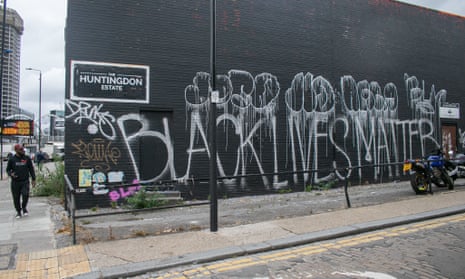It didn’t take long. The wheels of the Black Lives Matter movement are already starting to get stuck in the mire of doubt and suspicion. A few short weeks ago, politicians were eager to be photographed taking the knee in solidarity with the movement; now they’re desperate to distance themselves from what the movement demands – such as moving funds away from policing and into mental health services and youth work to prevent crime occurring in the first place. After a respectful period during which it would have been tone deaf to object to public support of the cause of the day, the BBC banned its hosts and presenters from wearing Black Lives Matter badges because it is seen as an expression of some sort of “political” opinion.
Everyone applauds a movement for social justice until it “goes too far” – when it starts making “unreasonable demands” in the service of its “political agenda”. This moment, where sympathetic onlookers start shimmying away from their earlier expressions of solidarity, was always inevitable. It is easy to agree that black lives should matter. But it is hard to contemplate all the ways the world needs to change to make them matter – and for most people, it’s simpler to say that the goal is admirable, of course, but that these particular demands from these particular protests at this particular moment are just going too far. We project our failures of imagination on to the movement, and we decamp from the cheerleading stands into the peanut gallery. “Defund the police”? How about we come up with a less provocative slogan, for a start? These Black Lives Matter protesters, they don’t make things easy for themselves, do they?
We tend to think that protest is confrontational, and change is consensual – first, a painful moment with marches in the streets and impassioned orations, followed by something less dramatic, a softer path of negotiation and adaptation. But the opposite is true. Protest is the easy bit. More specifically, protest is a smooth part sandwiched between two very rough ones.
Before protest there is a oppression, lack of popular support, and the hard work of awareness-raising. After that comes the high-octane action, the moral clarity – and allies hop on board. But once the first blood rush of protest subsides, the people who are still on the streets are mocked by their erstwhile allies, impatient to find fault with the movement and get back to their lives without any further disruption. What was universally celebrated a few weeks ago is now faintly embarrassing: too radical, too combative, almost comically unrealistic. You might think of the trajectory of the Black Lives Matter protests so far as like that famous quote misattributed to Gandhi, but this time in reverse: first you win, then they fight you, then they laugh at you, then they ignore you.
We have a great knack for supporting victims once the injustices are out in the open – when David and Goliath have been clearly identified, and a particularly British sensibility of fair play has been assailed. In the Windrush scandal, popular anger and support for the victims of the Home Office is what put a stop to their deportations and led to the resignation of Amber Rudd. National fury, at the peak of the coronavirus pandemic, managed to pressure an obstinate, bunkered government into scrapping the outrageous NHS surcharge for NHS staff, and extending residency rights to all the bereaved families of NHS victims of coronavirus. If it hadn’t been for Boris Johnson’s terror of losing him, the country’s disgust at Dominic Cummings would have turfed him out too, so mortally had he wounded the nation’s sense of justice.
But when it comes to the underlying injustice – to making the links between the deportation and death of a Windrush citizen, the NHS worker impoverished by Home Office fees and unsettled by cruel hostile environment policies, the unelected special adviser breaking lockdown rules, and the political party we keep voting in – we’re not so good.
The same is now happening with the Black Lives Matter movement. Everyone is on board with the principle, but when it comes to the change that is required, the idealistic passengers the movement picked up along the way suddenly come down with a case of extreme pragmatism.
Part of the reason for their belated reluctance is that the course of actual change is unflashy. After the first moment passes, the supportive ally has nothing to show for their continued backing for the cause: there are no public high-fives for your continuing solidarity. You can’t post it, you can’t hashtag it; most of the time you can’t even do it without jeopardising something, whether that’s your income, status, job prospects or even friendships.
But the main reason for the ebbing support is that change is just hard. If it wasn’t, the long arc of history that allegedly bends towards justice would be a very short one. And change is supposed to be hard. It is supposed to be political.
Movements such as Black Lives Matter aren’t hobbies or social clubs or edgy pop culture moments to be accessorised with. Change is supposed to have an agenda, otherwise it’s just a trend. When we hear that liberal politicians think the goals of the Black Lives Matter movement are nonsense, or that wearing a badge is political, or that support needs to be scaled back because it looks like there might be other, more nefarious forces at play, what we are really being told is: this is hard – and we are retreating to our comfort zones.

